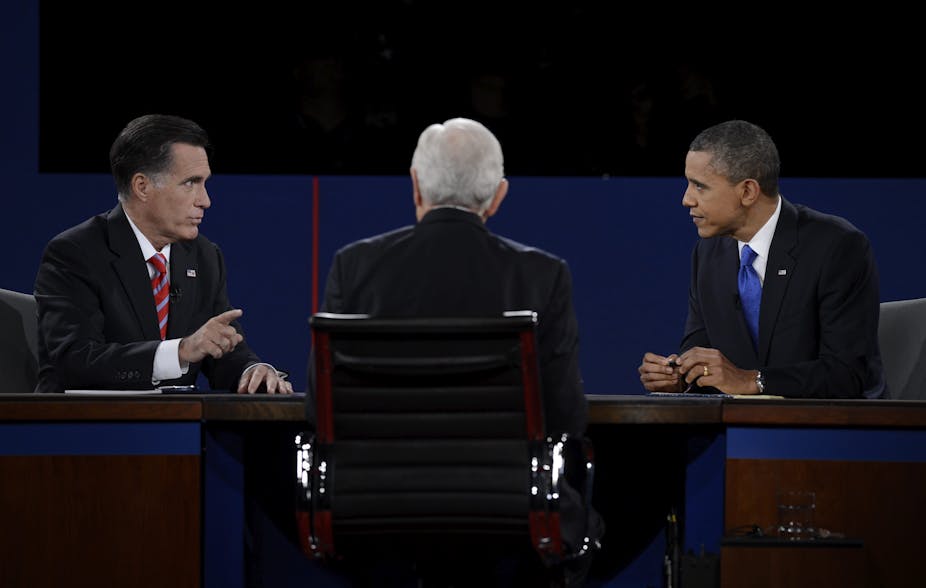In the heavyweight clash of the presidential candidates, round three went to President Barack Obama on points – not by knockout. This means the incumbent won two out of the three match-ups. Interestingly, however, it might not matter.
Prior to the debates, the mainstream academic consensus was that debates have rarely proved significant in presidential campaigns. As pointed out earlier today by my colleague Nicole Hemmer, the first debate disproved this belief. After the smoke had settled in Denver, no one was repeating this line.
The lesson for political scientists is not as simple as: “we were wrong. Who wins the debates does matter.” Although the Republican candidate, Mitt Romney, lost the final two debates, he will still emerge from them in a much stronger position than when he entered.
Obama can walk away knowing he probably won on the for-and-against tally. Romney, however, won the political dimension of the debates. In the long run, this is all that is relevant. This is reminiscent of the “we didn’t lose a battle” line to describe the American performance during the Vietnam War. It is true. It also doesn’t matter.
The subject of the third debate was foreign policy. As such, it was always going to favour the incumbent. Yet it was crucial for both campaigns. With the polls showing a dead heat, this was last chance to for each candidate to pull away from the other. This did not occur.
Obama had the advantage. He could draw upon a much thicker CV. For a great deal of the debate, Mitt Romney wasforced to take a “me too” position, while Obama could counter with “this is already happening, Governor”. This allowed Obama to land more of his punches, while deflecting Romney’s.
Due to Obama’s obvious advantage, Romney’s plan was to be light on his feet.
First, Romney moved hard to the left. When responding to the first question on terrorism and the Middle East, Romney outlined a strategy where the “bad guys” would be killed. He quickly added that his strategy would be “broader than that” and would include economic development, better education, gender equality and the rule of law: another Romney “five-point plan”. It would have sounded suspiciously liberal to many conservative viewers.
So Romney then stepped right, hard. He followed up by arguing against any cuts to the US military’s budget. His reasoning was that a strong military is essential for the United States to continue its leadership role in the world.
Obama’s position, on the other hand, is that the cuts in the military budget over the next ten years (excluding sequestration, which the President said during the debate “will not happen”) will only return it to pre-Iraq and Afghanistan levels, and are essential for getting control of the deficit.
These positions are not new in American politics. They are very similar to President Dwight D. Eisenhower’s battles with Democrats in Congress (particularly an upstart young Senator from Massachusetts named John F. Kennedy) over military spending. “Ike’s” position was that perfect security is impossible to obtain. As such, the United States could have as much security as it was willing to spend. On the other hand, Kennedy and colleagues argued that they would do whatever it took to secure the homeland.
It was during this confrontation that Obama landed the only “zinger” of the night and one of the few of the entire debating season. When Romney laid the shrinking size of the US Navy at Obama’s feet, the president countered by saying that there is a difference between size and capability. To drive his point home, he continued that they may have fewer ships but they “also have fewer horses and bayonets”. Zing.

On style, the third debate can roughly be divided into three stanzas. During the first, Obama was once again failing to make eye contact with the moderator and Romney. But he quickly warmed up and hit his stride. By the second stanza of the debate, Romney looked increasing uneasy and under pressure. By the final third of the debate, he was appearing uncomfortable. Obama was firmly on the offensive.
On substance, there was little between the candidates. They largely agreed on Syria, Egypt and Israel.
On China, both seek a “level playing field” and want Beijing to “play by the rules”. Romney remains committed to declaring China a currency manipulator “on day one”. But this is populist politics rather than serious policy.
First, in itself, declaring China a currency manipulator does nothing. All it achieves is opening the door to possible tariffs against China, which would then almost certainly be reciprocated by Beijing. In turn, this would send huge shockwaves through the global economy and probably destroy America’s fragile economic recovery.
Second, the Chinese currency has already been appreciating steadily against the greenback. It makes little sense to punish and humiliate a country that is doing what you want them to do. In short, even if Romney wins, and declares China a currency manipulator there is virtually no chance that this will lead to US tariffs on Chinese goods. It is political theatre, nothing more.
Foreign policy rarely gets a candidate elected to the presidency. But it can disqualify them for the job. Romney looked competent enough not to disqualify himself from the race.
The final debate failed to separate the candidates. As such, the next two weeks will be nail biting. From here the strategy will be simple. Pump as much money and effort into the six or so swing states, and hope for the best.

